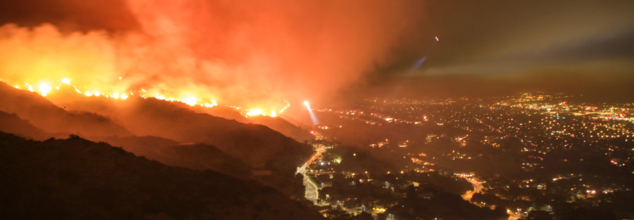
Study Says California Wildfire Can Affect The Heart
The recent wildfires have devastated hundreds of people who lived in LA, as they lose their homes as well as suffer the risk of getting injured. As we know, these wildfires pose a big threat to the lives of people in a direct and indirect way. Many people believe that as long as they are maintaining their distance and staying at home, they are safe, but these fumes may cause sever damage to the survivor's body in a different way. A new report shows that these fumes may affect people’s hearts.
The study found that wildfire smoke can cause serious heart problems, but the effects are different depending on the fire. This means we need to learn more about each fire to understand how it affects health. Because climate change is making big fires more common, it's important to know these risks so we can protect people. These findings were filed in the Journal of the American Heart Association.
This study looked at two big fires from 2018, the Mendocino Complex fires and the Camp Fire. The Mendocino fires burned for a long time in Northern California. People near these fires had more heart attacks, heart failure, strokes, and even died from heart problems. The Camp Fire was the worst fire ever in California, but surprisingly, people near it didn't have these same heart problems that year. This makes scientists wonder why the two fires had such different effects on people's hearts.
Why Are These Fires Different Than The Ones Before?
Scientists aren't sure why the Mendocino and Camp fires affected hearts differently. The study says we need more research to figure it out. It's important to understand these differences because big fires are becoming more common. If we know why some fires are worse for hearts, we can do a better job of protecting people.
The study looked at the health records of over 3.2 million adults in Northern California. This huge amount of information helped them see the link between wildfire, smoke and heart problems. They found that people who breathed in a lot of smoke from the Mendocino fires had a 23% higher chance of heart problems, including dying from heart problems, going to the hospital for a heart attack, heart failure, or a stroke. The risk of dying specifically from heart problems was 36% higher. This shows how dangerous breathing wildfire smoke can be. But the study also found that people near the Camp Fire didn't have these same increased heart risks, which makes scientists want to learn more about why.
What Did The Study Find?
Scientists have a few ideas why the Mendocino and Camp fires had different effects on people's hearts. One big reason might be how long the fires burned. The Mendocino fires burned for almost two months, meaning people breathed in smoke for a long time, around 26 to 51 days. This long smoke exposure probably caused more heart problems. The Camp Fire was put out faster, so people were only exposed to smoke for 11 to 15 days, which might have meant fewer health problems. Another thing that might have helped during the Camp Fire was that people were told to stay inside, schools closed, events were canceled, and people were told to wear masks. This probably helped protect them from the bad smoke. Also, the stuff that burned in each fire was different, and some burning stuff might be worse for your heart.
Scientists say we need to do more research. They want to know how things like staying inside and wearing masks help people during fires. They also want to learn more about each fire, like how long it burns, how strong it is, and what kinds of things burned. This will help them know which fires are most dangerous. It's also important to learn about the long-term health problems from breathing wildfire smoke, especially heart problems. Because big fires are happening more often because of climate change, this research is really important for keeping people safe and healthy.
© 2024 Bennett, Coleman & Company Limited

